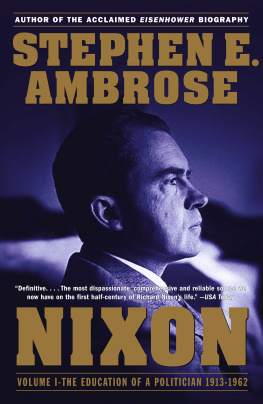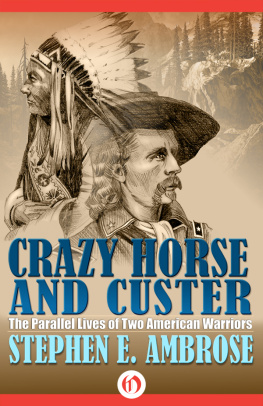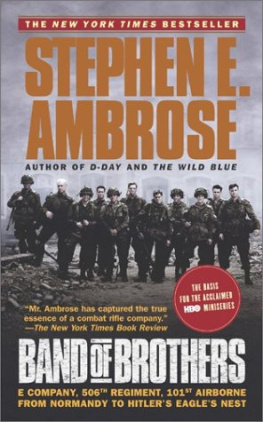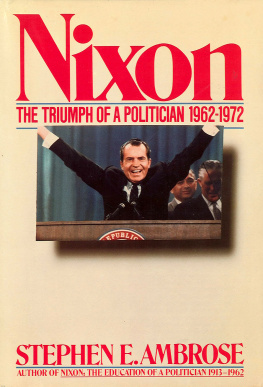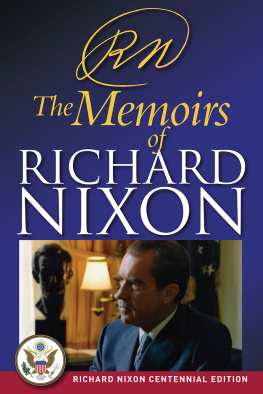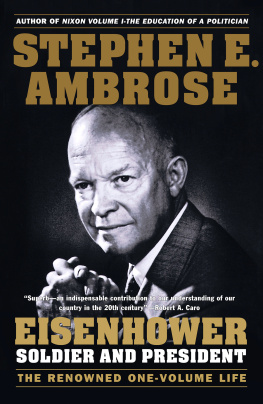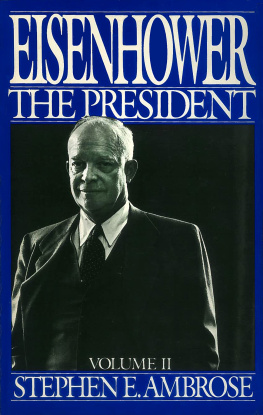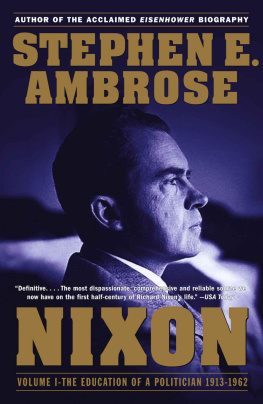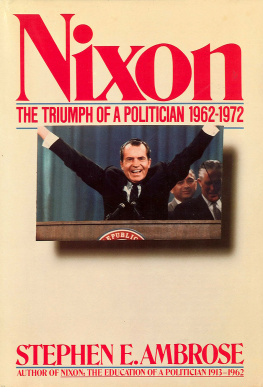We hope you enjoyed reading this Simon & Schuster eBook.
Join our mailing list and get updates on new releases, deals, bonus content and other great books from Simon & Schuster.
C LICK H ERE T O S IGN U P
or visit us online to sign up at
eBookNews.SimonandSchuster.com
Thank you for downloading this Simon & Schuster eBook.
Join our mailing list and get updates on new releases, deals, bonus content and other great books from Simon & Schuster.
C LICK H ERE T O S IGN U P
or visit us online to sign up at
eBookNews.SimonandSchuster.com
Stephen E. Ambrose is the author of the definitive and highly acclaimed two-volume biography of Dwight D. Eisenhower, editor of the Eisenhower Papers, and Professor of History at the University of New Orleans. His other books include Pegasus Bridge .
authors.simonandschuster.com/Stephen-E.-Ambrose
A LSO BY S TEPHEN E. A MBROSE
Upton and the Army
Halleck:
Lincolns Chief of Staff
Ikes Spies:
Eisenhower and the Espionage Establishment
Rise to Globalism:
American Foreign Policy 1938-1970
Crazy Horse and Custer:
The Parallel Lives of Two American Warriors
Eisenhower and Berlin, 1945
Duty, Honor, Country:
A History of West Point
The Supreme Commander:
The War Years of General Dwight D. Eisenhower
Eisenhower:
Soldier, General of the Army, President-Elect 1890-1952
Eisenhower:
The President
Pegasus Bridge:
June 6,1944
For my brothers Harry and Bill, who always ensured a two-to-one vote for Nixon from the Ambrose boys .
CONTENTS
CHAPTER ONE
FRANK AND HANNAH
18781912
R ICHARD N IXON had no famous ancestors, nor any who were rich. There was not a political leader among them. He came from humble folk and was born in the turn-of-the-century California equivalent of a log cabin.
On his fathers side, his progenitors were generally loud, boisterous, emotional, and Methodist. On his mothers side, they were generally quiet, restrained, unemotional, and Quaker. What they had in common was a penchant for taking risks. They were men and women unafraid to move on west with the frontier.
Nixons maternal ancestors were Germans who came to England to fight for Cromwell, and who received as their pay an estate in Timahoe, Ireland. Their name was anglicized from Melhausen to Milhous. In Ireland, the Milhouses became Quaker converts of William Penn, and in 1729 Thomas Milhous and his family migrated to Chester County, Pennsylvania. A century later, his descendants were living in a Quaker colony in Ohio. In 1854, when Richards grandfather, Franklin Milhous, was six years old, the family moved west again, to Jennings County, Indiana. The family was abolitionist, and the farm was a way station on the Underground Railroad. In 1879 Franklin Milhous, a widower at age twenty-eight, married Almira Burdg. Together they raised two sons and seven daughters; the daughters included Richard Nixons mother, Hannah, born in 1885.
The Milhouses were gentle Quaker folk, living an unpretentious and frugal life. Almira was a schoolteacher; Franklin, a farmer. Ordinary though their occupations were, they shared an urge to migrate. California beckoned, for all its usual reasonsthe agreeable climate, the orange groves, the space, the low price of landand because in 1887, just east of Los Angeles, the Society of Friends had founded a Quaker community, Whittier, named for the famous Quaker poet, John Greenleaf Whittier. The founders chose a site away from the railroad line, a site suitable for the peaceful, conservative Quakers, who wanted to grow their crops and live their lives away from the city and the hurly-burly of modern life. The lure proved irresistible to many Indiana Quakers, including nearly the whole of the large Milhous clan. Whittier soon became the largest Quaker colony in the United States.
In 1897 Franklin, his mother, his wife Almira, and his nine children made the move. They brought with them the doors, window frames, and much of the lumber from the farmhouse in Indiana. Franklin loaded it on a freight car, along with his livestock. On the outskirts of Whittier he planted orange groves and a nursery. A good husbandman, he was successful enough to become a prominent member of the community, well known for his honesty. His children helped him graft the plants; he guaranteed the pedigree and hardiness of each plant, and if it sickened and died, or did not grow true, he would replace it. He also traded actively in real estate. He saved enough money to establish a trust fund at Whittier College for his grandchildrens education.
While Franklin tended the crops, Almira made their home into a center for social and religious activities, with her dining room as the focus of events. She loved gathering the constantly growing Milhous family around her; in time her family reunions ran to forty and fifty people. They used thee and thou and other Quaker expressions in their ordinary speech. Religion, work, and family were the center and almost the circumference of their existence. The religion was neither overbearing nor overpowering, rather peaceful and comforting, but it was always therein speech, in dress, in mannerisms, in daily prayers and Bible readings. It was a religion without doctrines, one that put a great stress on individual conscience and responsibility.
Franklin was a jovial man, liked by everyone and adored by his family. He took Almira and the children on trips, to San Francisco and Yosemite. Father loved music, Hannah later told reporter Bela Kornitzer. He sang in the church choir and played the organ. Later on, he took up the accordion. Evenings, he used to sing hymns and then read aloud to us. His favorite tale was James Whitcomb Rileys Bear Story . Hannah said her mother Almira was even more appreciative of the pleasures of life.... She loved social contacts and special events, whether in our home, picnics at
Richard Nixon had vivid memories of his grandmother Almira. My grandmother set the standards for the whole family. Honesty, hard work, do your best at all timeshumanitarian ideals. She was always taking care of every tramp that came along the road.... She had strong feelings about pacifism and very strong feelings on civil liberties. She probably affected me in that respect. At her house no servant ever ate at a separate table. They always ate with the family. There were Negroes, Indians and people from Mexicoshe was always taking somebody in.
Most of all, Almira held the family together. Every year at Christmas and usually once during the summer we had a family reunion.... She was a prolific letter writer. On birthdays she composed rhymes and couplets and sent them to us. She used the plain speech, thee and thou, exclusively, but her daughters did not use it with their children.
Almira was a staunch Republican, as were most Quakers with their abolitionist backgrounds and dedication to hard work and thrift. She virtually worshipped Lincoln, Richard Nixon later recalled. On my thirteenth birthday she gave me, in addition to a very welcome five-dollar bill, a picture of her idol. Underneath, written in her own hand, was the last part of Longfellows Psalm of Life . I can remember part of it even now:
Lives of great men oft remind us,
We can make our lives sublime,
And departing, leave behind us,
Footprints on the sands of time.
Almira and Franklin Milhous emphasis on religion, family, and duty dominated Hannahs youth, and left her with lifelong values. To an outsider her life may have seemed dull and dispiriting, her boundaries limited by the backwater town where nothing ever happened, but she found Whittier a source of strength and comfort. Her father gave her security; her mother, inspiration and guidance; her sisters and brothers and the entire Quaker community provided playmates aplenty, while church, school, and work were outlets for her energy.
Next page
